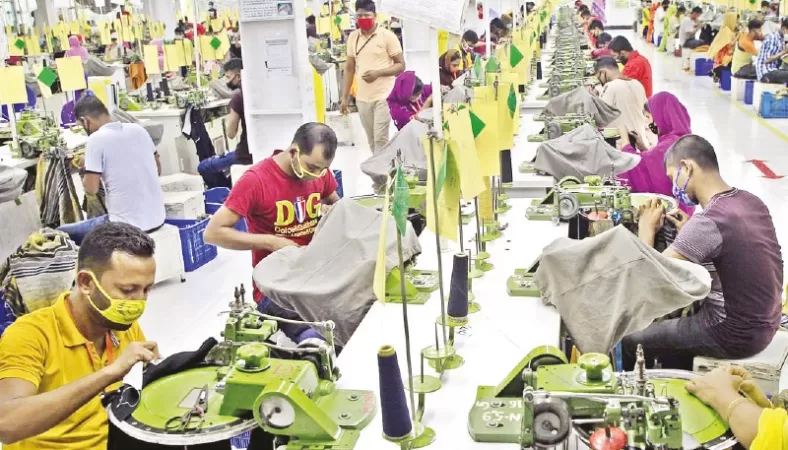
Energy crisis: RMG makers facing schedule disruptions

The country’s export-oriented apparel manufacturers say they are facing uncertainties in delivering goods on time as low gas supply and power rationing have disrupted the backward linkage supply chain.
Already, a good number of apparel exporters have witnessed at least seven to 10 days of schedule disruptions due to a lack of raw material supply on time. The situation deteriorated further after the record hike in diesel prices.
It has not only reduced productivity but also increased the cost of manufacturing by 5-15 per cent, depending on goods. It will also put exporters in tougher competition.
Industry people said that they are trying to maintain shipment deadlines at any cost, but diesel prices will make them losers financially.
To keep buyers’ confidence in placing more orders and take benefits from the US-China-Taiwan crisis, exporters have urged the government to supply uninterrupted gas and electricity considering export earnings.
The general index score of manufacturing was down by 6 percentage points to 489.73 in April, which was 520.90 in March, though production grew by 4 per cent year-on-year in April, according to the Bangladesh Bureau of Statistics (BBS).
April was the third month in a row that registered slower industrial production after the index score hit 566.19 per cent in January, the highest in three years.
Fakir Fashion Managing Director Fakir Kamruzzaman Nahid said that his factory’s gas pressure is always below 5 PSI but has declined to zero many times. On the other hand, he has to face four hours of load-shedding per day.
His per day energy and power cost has increased to Tk 20 lakh from Tk 10-12 lakh and he has faced five to seven days of schedule disruptions due to the ongoing energy crisis.
“I am continuing production by using diesel-fired generators, but the government increased fossil fuel prices by 42.5 per cent. It is almost impossible for backward linkage suppliers to continue production by using generators,” Nahid said.
“If I miss shipments, buyers will ask for a 5 per cent discount,” Nahid added.
Nipa Group Managing Director Md Khosru Chowdhury said that he had received orders for 70,000 pieces of denim jackets from Indian buyers and the shipment schedule was July 30 but he shipped the goods on August 10.
“Local fabrics and accessories suppliers failed to meet the deadline, which hit our production plan. Dyeing and washing plants are highly dependent on gas supply because most of these factories are operating by captive power supply,” he said.
“It is quite impossible to run diesel-fired generators for eight hours while fuel prices have skyrocketed. Now I have rescheduled my work plan and my factory productivity has already fallen,” he added.
AL Shahriar Ahmed, managing director of Indet Group and director of the Bangladesh Garments Accessories and Packaging Manufacturers and Exporters Association, said though he is maintaining lead time by using generators at a high cost to retain his factory’s reputation, most of the association members are bound to keep operations stopped for four to five hours a day.
“I have to stock 30-35 per cent of goods to maintain lead time and am losing money because of high fuel prices and the exchange rate. Our association members claimed that they failed to meet deadlines by three to four days,” Shahriar said.
Israq Textile Mills Limited has 120 tonnes of yarn production capacity per day, but now the factory is producing only 60-65 tonnes. Md Fazlul Hoque, managing director of the mill, said their production cost is increasing day by day due to the power and energy crises.
“We have urged the government several times to ensure uninterrupted power supply, but they have not responded positively,” he added.
This came at a time when apparel exporters witnessed a 12.17 per cent decline in work orders during the March-June period of 2022 compared to the same period last year while buyers are pressuring to reduce apparel prices considering the ongoing global economic crisis.
Sector insiders said that though they are passing a critical time due to low orders, there can be new opportunities due to the US-Taiwan-China crisis. To take advantage of that, delivering goods on time is the most important thing to create confidence among buyers.
“We are trying to meet shipment deadlines even by incurring losses to benefit from the new opportunities. The government should focus on this. If we can grow buyers’ confidence amid the global situation, our exports will rise, which will help increase forex reserves,” Ashikur Rahman Tuhin, managing director of TAD Group, told.
The government is going to set a weekly holiday roaster for the country’s export-oriented apparel factories to reduce the load-shedding pressure so that it can supply power to the factories.
The decision came at a meeting between business leaders and the power, energy and mineral resources ministry on Sunday (August 6).
Editor & Publisher: S. M. Mesbah Uddin
Published by the Editor from House-45,
Road-3, Section-12, Pallabi, Mirpur
Dhaka-1216, Bangladesh
Call: +01713180024 & 0167 538 3357
News & Commercial Office :
Phone: 096 9612 7234 & 096 1175 5298
e-mail: financialpostbd@gmail.com
HAC & Marketing (Advertisement)
Call: 01616 521 297
e-mail: tdfpad@gmail.com